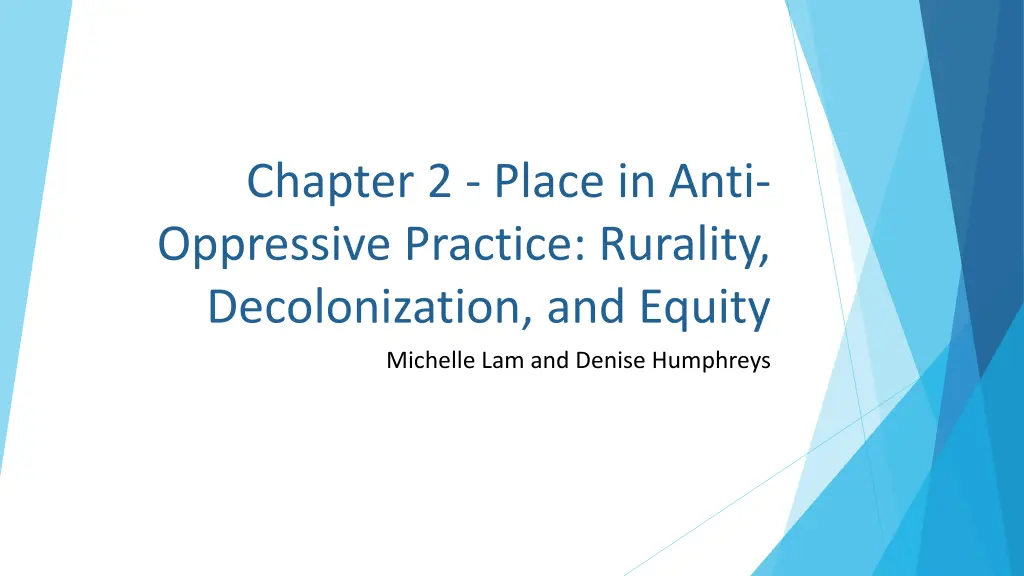
Understanding Anti-Oppressive Practices in Rural Social Work
Explore the application of anti-oppressive practices in rural settings, focusing on themes of displacement, colonialism, and accessibility. Learn about the challenges faced by rural communities and the importance of ethical frameworks in social work.
Download Presentation

Please find below an Image/Link to download the presentation.
The content on the website is provided AS IS for your information and personal use only. It may not be sold, licensed, or shared on other websites without obtaining consent from the author. If you encounter any issues during the download, it is possible that the publisher has removed the file from their server.
You are allowed to download the files provided on this website for personal or commercial use, subject to the condition that they are used lawfully. All files are the property of their respective owners.
The content on the website is provided AS IS for your information and personal use only. It may not be sold, licensed, or shared on other websites without obtaining consent from the author.
E N D
Presentation Transcript
Chapter 2 - Place in Anti- Oppressive Practice: Rurality, Decolonization, and Equity Michelle Lam and Denise Humphreys
Introduction This chapter will discuss: What it mean to practice social work with rural clients from an anti-oppressive perspective. Using the method of duo-ethnography, a collaborative research methodology in which two or more researchers of difference juxtapose their life histories to provide multiple understanding of the world (Sawyer & Norris, 2012, p. 9) to draw on personal narratives as in education and social work settings. Recurring themes of displacement, colonialism, accessibility, ethics, and stigmatization reveal themselves through our reflections.
Learning Objectives By the end of this chapter you will: Learn the application of anti-oppressive practice in rural settings Learn reflexivity when working with rural communities Learn the use of practice frameworks that may be helpful when working with rural clients Learn the application of the Canadian Association of Social Workers (CASW) code of ethics in context with anti- oppressive practice
Practice Area and/or the Population of Focus Rural contexts within the Western Canadian provinces are a significant portion of the population, although the term rural is defined differently in different contexts. Rural can mean non-urban, or it can be used to denote a specific community or region. Centering place requires acknowledgement of colonial histories and lasting impacts. Place can encompass land, nature, the non-human world, and community. A definition of place is needed, which recognizes continual interaction with the outside, and acknowledges power, class, gender, and racial dynamics within local places and broader structures.
Overview of Policy and Service Delivery Issues Displacement Rural places experience inequity through displacement. Displacement also occurs when rural residents may be forced to leave their homes for education, socioeconomic reasons or to access social services. As services become more centralized in urban areas, rural communities and the residents within are unequally served. Rural residents experience social injustice in transportation, healthcare (both physical and mental), education, government and private sector services, and employment (Senate Committee on Agriculture and Forestry, 2006 as cited in Annie & Patterson, 2005).
Overview of Policy and Service Delivery Issues White Notions of Success Social work and education are overwhelmingly white fields, and the results of this domination permeate their values. These white ideals or values are often based on deficit models of the other and attribute the lack of this arbitrary definition of success to personal factors rather than systems (Delpit, 2006; Park, 2005). When students or clients are not living up to the established white norms, then it is up to the helper to fix them. The idea of fixing often means assimilating into the very structures and values systems that oppress them (Gorski, 2008, p. 518).
Overview of Policy and Service Delivery Issues Rural Relationships Rural communities can be tightly knit places, which can lead to complexity within professional boundaries. There are many opportunities for collecting feedback and developing relationships that are more holistic instead of one- dimensional; however, there can also be difficulties with the dual relationships that we described. For some, the personal approach builds connections and strengthens relationships. For others, constant accessibility can lead to fatigue and burnout (Lam & Kirk, 2020).
3 Levels of Social Work Practice Reflect on the locations within the social structures (macro) of our practice working with individual clients and families (micro) and relevant communities and organizations (mezzo). Language and pedagogy are both influenced by micro, mezzo and macro levels: language exists nominally in education, but the discourse itself, the pedagogies by which it is taught, and the social context where it is taught are affected by community and systemic levels. No place of practice exists exclusively at one level. There may be a focus on one in specific settings, but we found they are always interrelated. Therefore, we found reflexivity essential to shift our orientation to all levels by having each of them on our radar.
Conclusion Reflexivity is crucial to anti-oppressive practice: Spending time to reflect on personal motivations, systems of belonging and examining current forms of responsivity can strengthen practice. Whiteness pervades mainstream social work in Canada. Some of you, especially those who are Black, Indigenous, and/or racialized, probably are already aware of this. If you have not already, question why whiteness is often the default in settler social work systems and seek to unlearn its supremacy by listening and engaging with the BIPOC communities around you. Displacement is often the result of the lack of equity and social services available in rural communities. The application of anti-oppressive practice to the CASW code of ethics needs to be addressed by social workers.
Additional Resources Jeffery, D. (2005). What good is anti-racist social work if you can t master it?: Exploring a paradox in social work education. Race, Ethnicity and Education, 8(4), 409-425. McMahon, J., Borg, D., & Delaney, R. (2010). Anti-oppressive social work practice with Aboriginal Peoples. In K. Brownlee (Ed.), Social work & Aboriginal peoples: Perspectives from Canada s rural and provincial norths (pp. 43-53). Lakehead University, Centre for Northern Studies. Mullaly, R. P., & West, J. (2018). Challenging oppression and confronting privilege: A critical social work approach to anti-oppressive and anti-privilege theory and practice. Oxford University Press. Strega, S., & Esquao, S. A. (2009). Walking this path together: Anti-racist and anti-oppressive child welfare practice. Fernwood Publishers.
References Annie, R., & Patterson, L. (2005). Rural poverty in Canada. Rural Development Institute [PowerPoint slides]. Brandon University, MB. Delpit, L. (2006). Other people s children: Cultural conflict in the classroom (1st ed.). The New Press. Gorski, P. C. (2008). Good intentions are not enough: A decolonizing intercultural education. Intercultural Education, 19(6), 515 525. Lam, M., & Kirk, J. (2020). To friend or not to friend: Teachers and students on social media. Research Connection Podcast. Brandon University. Park, Y. (2005). Culture as deficit: A critical discourse analysis of the concept of culture in contemporary social work discourse. Journal of Sociology and Social Welfare, 32, 11-33. Sawyer, R. D., & Norris, J. (2012). Duoethnography: Understanding qualitative research. Oxford University Press.






















